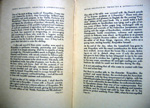PETER KROPOTKIN: TRIBUTES & APPRECIATIONS
One of the most striking works of Kropotkin, I may say even classical by its form, deep knowledge, billiant
argumentation and noble purpose, is his "Fields, Factories and Workshops." Here he shows to toiling humanity
with facts and figures the abundance of produce obtainable, the comforts and pleasures of life possible if
physical and intellectual work are combined, if agriculture and industry are to go hand in hand. I think that for
the last quarter of a century no book has appeard so invigorating, so encouraging and convincing to those who
work for a happier society. No wonder that a London democratic weekly advised its readers to buy his book by all
means, even if they had to pawn their last shirt to raise the shilling.
... I often ask myself if there exists another man equal to Kropotkin in quickness, intensity, punctuality and
variety of work? It is simply amazing what he is capable of doing in a single day. He reads incredibly much, in
English, French, German and Russian; with minute interest he follows political and social evens, science and
literature, and especially the Anarchist movement in the whole world. His study, with its booklined walls, has
piles of papers, new books, etc., on the floor, tables and chairs. And all of this material, if not read, is at
least looked through, annotated, often parts are cut out, classified and put away in boxes and portfolios made by
himself. Kropotkin used to occupy himself for recreation with carpentry and bookbinding,... and all his work is
done with beautiful neatness and correctness.
To give an idea of the variety of his work, I shall describe my last visit to Kropotkin. I came with a French
scientist, also a great worker and a sincere admirer of Kropotkin. We found him in his study, hard at work, giving
thelast touches to a new edition of his "Fields, Factories and Workshops."
[ Page 24 ]
One side of his talbe was covered with the French proofs of "La Science moderne et L'Anarchie."
There were also the appendix and glossary in English for the coming "Freedom" edition of the same book.
On a small talb e a half finished article on Syndicalism was lying, and a pile of letters, some of
them twelve pages long, exchanged with an old friend and comrade of the Federation Jurassienne, and
dealing with the origin of Syndicalism, awaited an answer. Newspapers, books everywhere, volumes and
separate articles on Bakunin were about, as Kropotkin is at present edition a complete Russian edition
of Bakunin's works. In the midst of all these things, vigorous, alive, active as a young man, smiling
heartily, Kropotkin himself...
At the end of the day, when the household has gone to rest, Kropotkin, with his usual consideration
for those who have worked, moves about the house like a mouse, tiptoeing so as not to disturb sleep even
if only the servant has gone to bed. Often he has whispered to me to be careful so as not to awaken her.
Lighting his candle, he retires to his own room, sometimes till midnight reading new publications for
which he could not find time durning the day.
It is not astonishing that all who come in contact with him love and adore him.
But there is another side to his character. Kropotkin, the political and socail thinker, the revolutionist,
the Anarchist-Communist, with his fiery temperament of a fighter, with his inflexible principles, his
insight in political and social problems, is yet more admirable; he sees further, he understands better,
he formulates clearer than any of our contemporaries. Few people feel so deeply and acutely the suffering
and injustice of others, and he cannot rest until he has done all in his power to protect and help. From
1881, when he was expelled
[ Page 25 ]
|

|